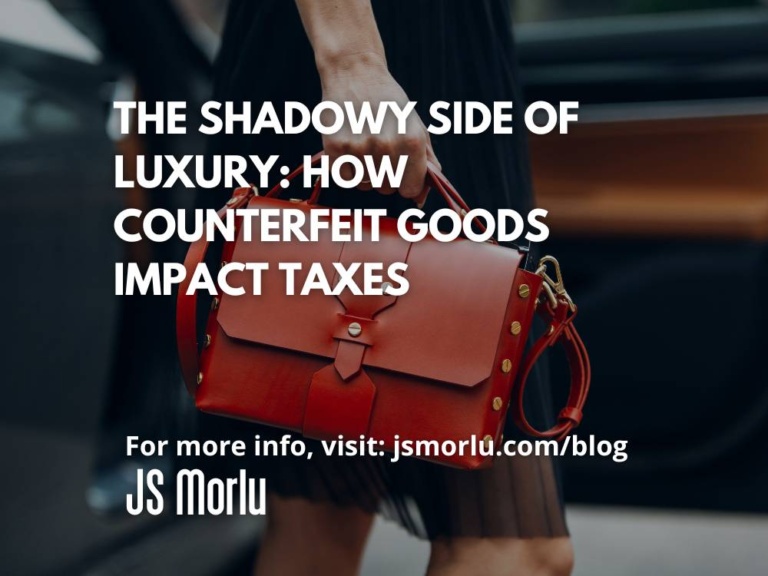The world of luxury fashion evokes images of elegance, exclusivity, and high-end craftsmanship. But beneath the glossy surface lurks a dark secret: the counterfeit industry. While designer knockoffs may appear as harmless imitations, their presence has a significant ripple effect, disrupting economies and impacting taxes for governments and consumers alike.
This article delves into the lesser-known issue of taxation within the counterfeit luxury market. We’ll explore how these imitations erode legitimate businesses’ revenue and create a complex challenge for tax authorities.
The Counterfeit Conundrum: A Threat to Tax Revenue
Imagine a ship, constantly repaired with new planks, yet forever the same. This allegory of Theseus’s ship reflects the struggle of tax authorities against the ever-present tide of counterfeit goods. Just as worn planks threaten the integrity of the ship, counterfeit goods create fiscal loopholes, draining potential tax revenue.
Counterfeiters operate in the shadows, bypassing regulations and evading taxes. Unlike legitimate luxury brands with strict manufacturing standards and tax obligations, these illegal businesses exploit loopholes and thrive in lax enforcement zones. This clandestine nature, coupled with the intricate web of global supply chains, makes it incredibly difficult for tax authorities to track and tax these illicit activities.
Furthermore, counterfeit goods are often sold through informal channels like street vendors or online marketplaces, bypassing established tax collection systems. This lack of transparency makes it nearly impossible to track sales and enforce tax laws, leading to substantial revenue losses for governments.
The impact is significant. Industry estimates predict a continuous rise in the global luxury goods market, reaching a staggering $418.84 billion by 2028. However, this figure could be even higher if the “superfake” market, known for its near-undetectable replicas, didn’t exist.

Consumer Consequences: Beyond the Allure of Lookalike Luxury
The allure of designer labels at a fraction of the cost can be tempting, but for consumers, there are hidden tax implications associated with counterfeit purchases. Often unaware of these potential risks, buyers can face legal and financial consequences, especially during tax audits.
Importing counterfeit products can incur tax liabilities, and consumers might be held responsible for these charges. This can turn a seemingly inexpensive purchase into a costly mistake.
The Ongoing Battle: Combating Counterfeiting and Tax Evasion
Law enforcement agencies and customs authorities are constantly on the lookout for counterfeiters. However, the industry’s underground nature presents significant challenges. From remote production facilities to the anonymity of online marketplaces, enforcing tax laws and intellectual property rights remains a persistent struggle.
International cooperation is crucial in dismantling these criminal networks. Organizations like INTERPOL play a vital role in disrupting distribution channels and production at the source. Tim Morris, INTERPOL’s Executive Director of Police Services, emphasizes the importance of this collaboration: “By attacking the distribution networks and disrupting production at the source… we have contributed towards globally protecting people and dismantling illegal networks.”
However, counterfeiters are adept at adapting their tactics, making it an ongoing cat-and-mouse game. Effective enforcement requires constant vigilance and collaboration between governments, international organizations, and the private sector.

The Path Forward: Collaboration and Innovation
Addressing the tax implications of counterfeit luxury goods requires a multi-pronged approach. Here are some key strategies:
- Regulatory Reform: Governments need to strengthen enforcement mechanisms, tighten tax regulations, and implement stricter penalties for tax evasion and intellectual property infringement.
- International Cooperation: Enhanced cross-border collaboration between law enforcement and tax authorities is essential to disrupt global counterfeit supply chains.
- Technological Innovation: Blockchain technology and digital authentication tools can help track the origin of products and verify their authenticity. Additionally, data analytics and artificial intelligence can empower tax authorities to identify patterns of illicit activity and target enforcement efforts more effectively.
- Consumer Awareness: Educating consumers about the true cost of counterfeit goods, including potential tax liabilities, is vital to discourage purchases and disrupt the market.
The Real Deal: Why Authenticity Matters
As Vogue famously reported in 2011, even Jane Birkin, the namesake of the iconic Hermes Birkin bag, acknowledged the prevalence of counterfeits. However, there’s an undeniable allure to the genuine article. Judith Thurman, discussing the allure of luxury with the New York Times, describes it as “an aura to the real thing… There was a spirit of going to the shop and paying more money than I could afford.”
While “superfakes” may be meticulously crafted, they lack the essence of authenticity – the heritage, craftsmanship, and the experience associated with a genuine luxury good.

Conclusion: Balancing the Books in the Counterfeit Culture
Taxation is a critical, yet often overlooked, aspect of the counterfeit luxury market. From lost government revenue to consumer liabilities, these replicas pose a significant threat to a healthy economic ecosystem.
As the counterfeit industry continues to evolve, a united front – with robust tax regulations, international cooperation, and cutting-edge technology – is essential to safeguard legitimate businesses, protect consumers, and ensure tax revenues are collected fairly. By working together, we can ensure that the true value of luxury is not undermined by the shadows of the counterfeit market.
JS Morlu LLC is a top-tier accounting firm based in Woodbridge, Virginia, with a team of highly experienced and qualified CPAs and business advisors. We are dedicated to providing comprehensive accounting, tax, and business advisory services to clients throughout the Washington, D.C. Metro Area and the surrounding regions. With over a decade of experience, we have cultivated a deep understanding of our clients’ needs and aspirations. We recognize that our clients seek more than just value-added accounting services; they seek a trusted partner who can guide them towards achieving their business goals and personal financial well-being.
Talk to us || What our clients says about us


